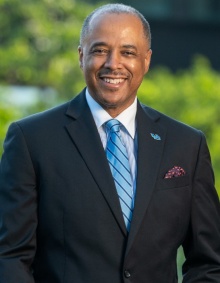Dean's Column
From Dean Keith A. Alford

As a social worker, social work educator, and citizen of the planet, human rights are never far from my mind. This issue of Mosaics—and the stories within—gives me the opportunity to share with all of you, our alums, friends and community, some refections on recent events, and how social workers, and social work education, remain a critical component of being part of positive change; of holding up human rights for all.
Our lead story is about using restorative practices as a method for addressing harms done; how those practices, mindfully and consistently incorporated, could begin to reduce societal ills like trauma, violence, crime, prejudice and hatred. Restorative practices are intended to foster listening and deeper understanding of each other. You will read about how Assoc. Prof. Diane Elze and Adjunct Instructor Dina Thompson, executive director of the Erie County Restorative Justice Coalition, are teaching our students these mindful skills, and working to incorporate them in our own school’s toolbox as well as into the broader community.
After the May 14 targeted mass shooting of innocent Black people by a white supremacist gunman here in Buffalo, where those 10 Black victims human rights were suddenly and violently removed, our university community saw the need to take action. The effects of grief and trauma from that horrific event are enduring. To begin and facilitate the healing process, the UB School of Social Work collaborated with the Center for Mind-Body Medicine, the Heart Nest, and the WNY Peace Center for a series of gatherings and workshops titled Embracing Buffalo. Nationally renowned speakers Dr. Sabrina N’Diaye, Dr. Carol Penn and Dena Adler, with the assistance of Kenya Pope, facilitated four days of events offering hope, healing, and renewal for community healers and survivors. The final two days were held at the UB Center of Excellence in Bioinformatics and Life Sciences, and served as a retreat for Black healers and leaders. We know that healing is not prescriptive; it is a personal journey that’s different for everyone. We feel fortunate to have been able to help community participants start on the long road toward healing from the racial trauma.
In a brief Q&A, we only scratch the surface of the impact that Prof. Hilary Weaver has had during her time here; she is leaving our faculty after almost 30 years. She will go on to roles in national and international organizations, continuing her deep commitment to shaping social work education, and to lifting up Indigenous and refugee voices; we will miss her presence here, but know with pride that she is doing important work.
Race and equity also play a part in another story in this issue, a profile of our PhD student Jessica Mencia. She speaks about the importance of abortion access, especially for people who have been traditionally marginalized; you will learn about her focus on including a broader range of voices in the policymaking that affects underprivileged populations. This of course leads me to the decision by the Supreme Court on Dobbs v. Jackson Women s Health Organization, overturning Roe v. Wade. These decisions effectively erased a half century of the right to choose to have an abortion, and are already having a devastating impact on the lives of many, who are unable to access necessary health care where they live.
With these and other ongoing challenges to human rights, whether by the courts, gun violence, racism, and economic disparities, we must maintain our belief in our profession, our practice of advocating for ourselves and each other; for and with those who need it most. Thank you as always for joining me in our commitment to social work practice, education, and awareness.
In camaraderie and solidarity,
Keith A. Alford, PhD, ACSW
Dean and Professor
Questions, comments? You may contact the Dean's office via email.